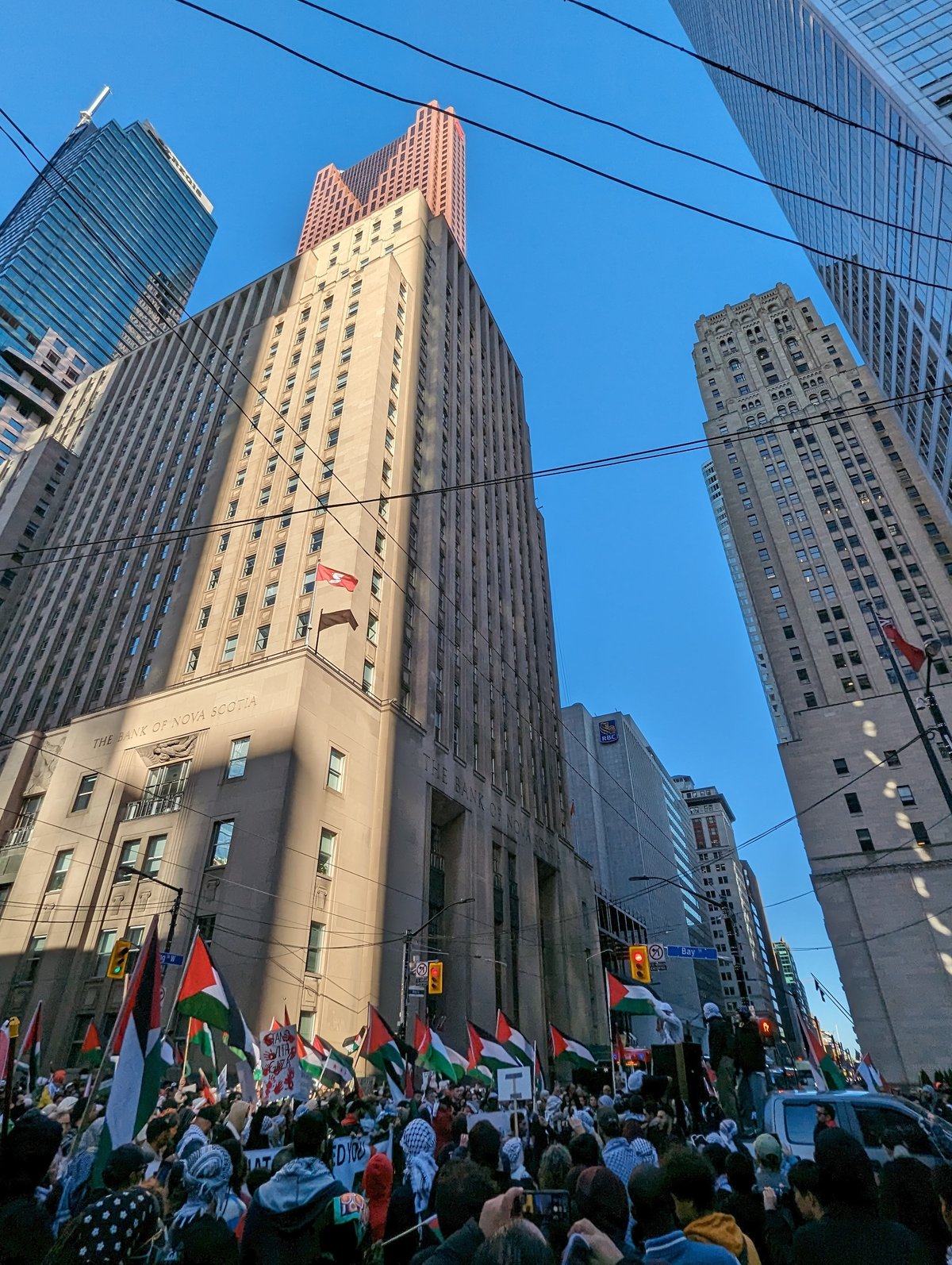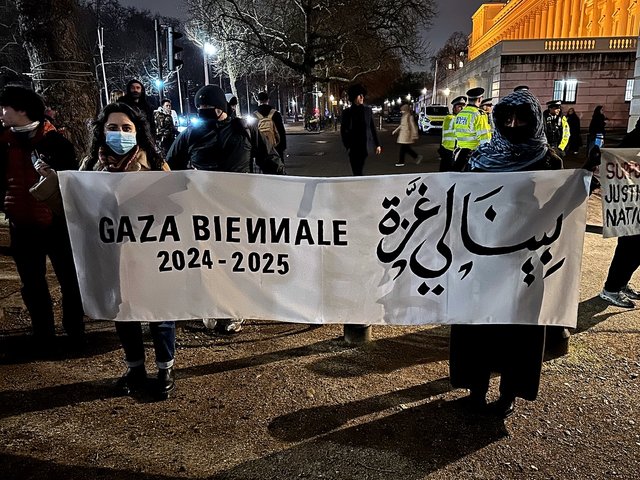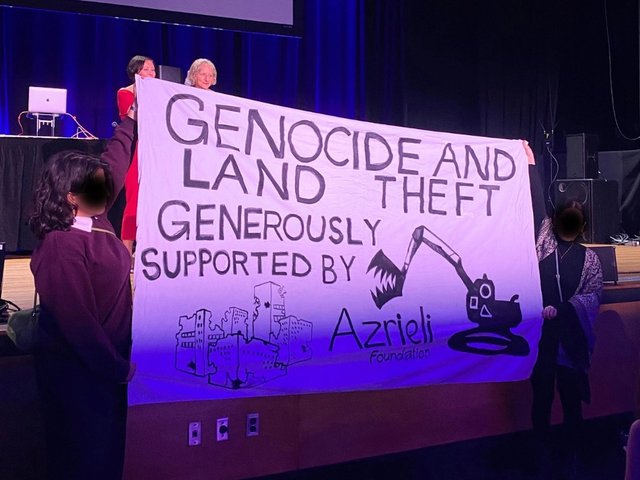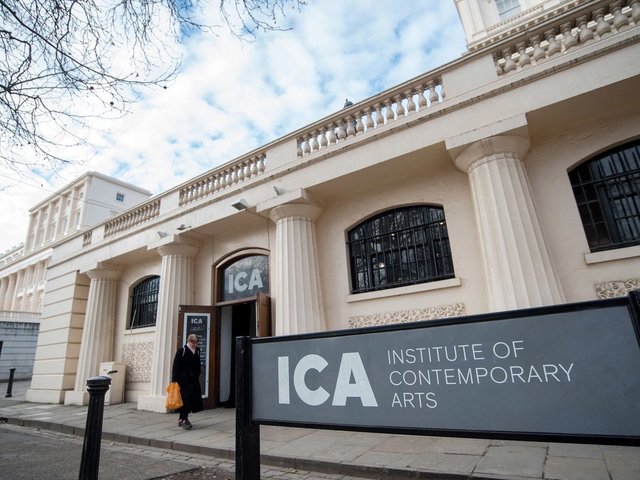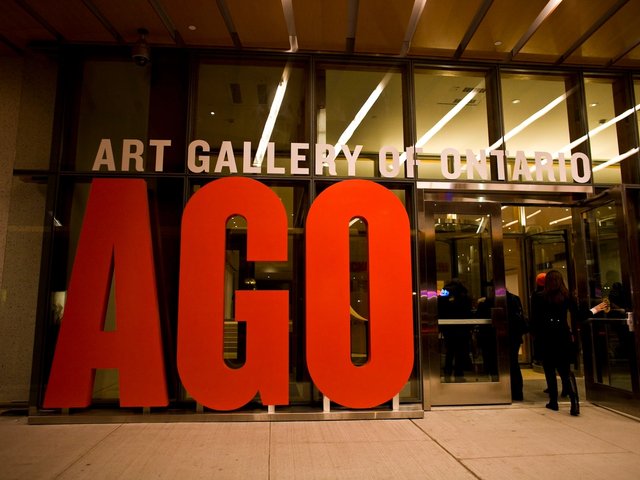In one of the latest protests stemming from the Israel-Hamas war, artists are boycotting Toronto’s Contact Photography Festival—an annual, month-long event that takes place throughout the city in May, with more than 130 exhibitions and 250 artists participating this year.
Earlier this year, a grassroots campaign started encouraging people to withdraw from Contact due to its long-time sponsor Scotiabank’s ties to the Israeli weapons manufacturer Elbit Systems. (Scotiabank had previously announced that it would end its sponsorship of the festival after this year, a serious blow to the arts organisation’s financial future.) The protest, organised by the groups No Arms in the Arts (NAITA, an artist collective that specifically formed to demand that prizes and festivals push Scotiabank to divest from Elbit) and Artists Against Artwashing (AAA, which calls on Canadian cultural institutions to divest from “settler colonialism and genocide”), has resulted in more than a dozen exhibitors dropping out of Contact this year. Earlier this week, Scotiabank announced that it has halved its stake in Elbit.
The AAA representative Mitra Fakhrashrafi tells The Art Newspaper that Elbit is “directly linked to the ongoing genocide on Gaza and across Palestine. In many instances, upon withdrawing from the festival, artists made clear to Contact staff and board that they wanted accountability, they wanted Contact to leverage their relationship with Scotiabank and ask them to divest. We, artists and cultural workers, do not want to participate in Scotiabank's war profiteering, and we do not want arts funding that is tainted by genocide.”
The Brooklyn-based artist Umber Majeed's exhibition Dil Dil Trans-Pakistan (Heart, Heart Trans-Pakistan)—examining, among other issues, a corrupt real-estate company in Lahore—is now virtual after initially being scheduled as part of Contact. Her decision to withdraw was based on ethics, she says. “If I’m talking about land-grabbing and class warfare by large corporations, ethically and morally as an artist, it doesn’t make sense to take money from people who are contributing to that process elsewhere,” Majeed says. “There’s a war happening and a genocide, and it’s real. I don’t want my work to be associated with that.”
In November, Majeed and a curator she was working with at the artist-run centre Trinity Square Video—which was scheduled to host Majeed's show—had already decided to reject Contact’s C$3,000 artist fee. That decision, Majeed says, had “immediate repercussions” when the curator was fired, a move that revealed “the hypocrisies of the non-profit art world”. Majeed thinks NAITA is an important campaign, “because we’re trying to untangle very embedded infrastructures—the weapons industry, the corporate world and the art world—and this is a very particular time to talk about it.”
Members of NAITA and AAA—who have also called for the arts community to withdraw support from the Scotiabank-funded film festival Hot Docs and the Giller Prize literary award—claimed a partial victory in light of Scotiabank’s recent announcement that it has drastically cut down its stake in Elbit. “We consider this a direct result of the public pressure Scotiabank is facing and the people's growing demands for Scotiabank to drop Elbit,” Fakhrashrafi says. “We see full divestment from arms manufacturing on the horizon, and we will continue to escalate and organise with arts workers until Palestine is free.”
Contact’s longtime chief executive, Darcy Killeen, says the whole situation has been “heartbreaking” for the 28-year-old festival, which he has directed for the past two decades—15 years of which were funded by Scotiabank as title sponsor. “We are a community-based organisation, and we share many of the same values as the campaigners,” Killeen says, adding that he was “shocked” when Scotiabank’s C$600m ($440m) stake in Elbit was publicly revealed last November.
Sponsor cashes out
“Scotiabank has been an incredible sponsor,” Killeen says. “They have supported 2,500 artists and given C$1m ($734,000) in artist fees directly to artists.” He adds that the festival has grown by leaps and bounds while working with Scotiabank, with a new outdoor public installation programme and increased numbers of staff and exhibitors. But when Contact met with Scotiabank in May 2023 about a funding renewal, “they told us they were changing their priorities for what they would fund in 2024", Killeen says. "They said we had until 31 May 2024, and then that was it.”
Killeen sees the broader picture of losing Scotiabank’s sponsorship as a “shift in funding priorities for sponsors and donors away from culture and towards ‘cause-based’ issues—like health care, child welfare and international relief efforts”. He notes that Scotiabank has been “reducing the cultural properties they’ve been involved with in general”. (The bank has also divested from Toronto’s annual all-night arts festival Nuit Blanche.)
With a sudden shortfall of the roughly C$500,000 ($367,000) per year that Scotiabank previously contributed, Contact has begun a four-year restructuring plan that will see the layoffs of two of the festival’s six full-time staff members. Contact expects revenues to fall by 65% in 2025.
“Our focus has always been on empowering marginalised communities,” Killeen says. “Now those voices will be diminished due to funding issues.” He adds that Contact has been “fully supportive of people who withdrew” from its programmes this year, and he is personally looking forward to a meeting with NAITA and AAA members. “Our values are very much aligned,” he says. “Now we have the opportunity to sit down and work together for the best.”


